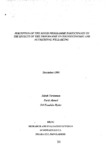| dc.contributor.author | Tarannum, Sabah | |
| dc.contributor.author | Ahmed, Farid | |
| dc.contributor.author | Hyder, SM Ziauddin | |
| dc.date.accessioned | 2019-11-06T10:33:56Z | |
| dc.date.available | 2019-11-06T10:33:56Z | |
| dc.date.issued | 1995-12 | |
| dc.identifier.citation | Tarannum, S., Ahmed, F., & Hyder, S. Z. (1995, December). Perception of the IGVGD programme participants on the effects of the programme on socioeconomic and nutritional well-being. Research Reports (1995): Health Studies, Vol - XVIII, 38–54. | en_US |
| dc.identifier.uri | http://hdl.handle.net/10361/12881 | |
| dc.description.abstract | Income Generation for the Vulnerable Group Development (IGVGD) Program is one of
the main development initiatives of BR.A..C targeted to the poorest rural women. The
IGVGD programme was launched in 1987 in collaboration with the World Food
Programme (WFP) and the Government of Bangladesh. The Programme includes activities
such as credit, savings, training, poultry rearing, health and nutrition education, and general
awareness. The major objective of the programme is to increase real income of the rural
destitute women through high yield variety (H1:'V) poultry rearing and other income
generating activities. The objectives of this study are to examine the perception of the
programme participants on the impact of the IGVGD programme on nutritional status
particularly of the women and children as well as the perception of the IGVGDP women
on their well-being. Data were collected through focus group discussions (FGDs). Six
villages of Tangail thana were randomly selected and 6 FGDs were conducted with
IGVGDP participants in September and October 1995. j\_,fajor issues discussed during the
FGDs were: training of the poultry workers and key rearers, credit schemes for poultry
rearing, vaccine/drugs, issue-based meetings, wheat distribution food availability, control
over household resomces, women's status within the household and community, health
and nutritional status and the sanitary conditions of the households. The study revealed that
the participating women had a great deal of interest in poultry rearing because the
technology was traditionally known to them which could also integTate with their normal
household activities. Poultry workers had many responsibilities to prevent poultry mortality
and they were highly respected by the villagers. Majority of the women were economically
self-supportive and they vvere not dependent on the male members for poultry rearing.
They could improve the socioeconomic conditions through skill development training and
other awareness programmes. Most IGVGDP women came to know about the common
diseases (diarrhoea. common cold, nightblindness, anaemia, etc.) through attending the bimonthly
issue-based meetings. The study also shows that the participating women were
more conscious about health and nulrition-related issues and problems. The study further
reveals that the women's mobility such as day to day contact with local Union Parishad . 40
u
members and the development workers had been increased. They could gradually
overcome the problems which restricted their involvement into development activities and
their attitudes had begun to change. The IGVGD programme reached the target
population successfully and helped improve their socioeconomic conditions and nutritional status. | en_US |
| dc.language.iso | en | en_US |
| dc.publisher | BRAC Research and Evaluation Division (RED) | en_US |
| dc.subject | IGVGD Program | en_US |
| dc.subject | Rural women | en_US |
| dc.subject | Vulnerable group | en_US |
| dc.subject | Nutritional well-being | en_US |
| dc.subject | Socio-economy | en_US |
| dc.subject.lcsh | Nutrition. | |
| dc.subject.lcsh | Health. | |
| dc.subject.lcsh | Health, Nutrition, and Population Program (BRAC). | |
| dc.title | Perception of the IGVGD programme participants on the effects of the programme on socioeconomic and nutritional well-being | en_US |
| dc.type | Research report | en_US |

